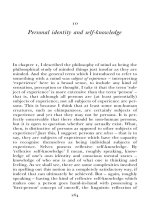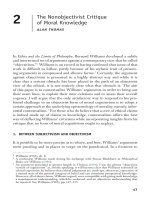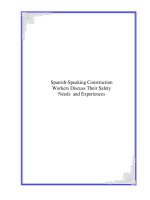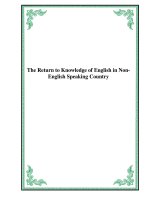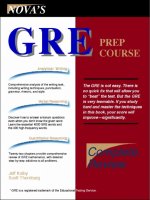KNOWLEDGE CONSTRUCTION
Bạn đang xem bản rút gọn của tài liệu. Xem và tải ngay bản đầy đủ của tài liệu tại đây (565.47 KB, 12 trang )
KNOWLEDGE CONSTRUCTION
Group members:
1.
2.
3.
4.
Nguyen Chi Cuong
Pham Thi Ha
Nguyen Thuy Huong
Nguyen Minh Ngoc
Introduction
We live in a world that is constantly changing at an everincreasing pace. In fact, we are swimming in a sea of
information. We also need to be able to effectively make
use of this vast volume of information in order to construct
knowledge.
In addition, we also have available a wide range of digital
tools - often referred to as “mind tools” - which can offer us
new ways of interacting with information.
So we need to move beyond asking students questions that
they already know the answer to or that they can search for
online instantly. We should require them to use
information to construct their own understandings.
Introduction
We want them to construct knowledge by engaging in
deep learning where they have to interpret, analyze,
synthesize and evaluate information in order to construct
understanding. We want them to use their existing
knowledge and move beyond mere retaining in order to
generate ideas or knowledge that is new to them.
Then, once students grasp concepts and ideas in order to
deepen their understandings, they need to apply their
learning in a new context.
Deep understanding also means being able to make
connections across and between “big ideas”.
Knowledge
construction
Provides a
rationale for
giving young
people an
opportunity to
move beyond
memorising
facts and to
develop their
critical thinking
and reasoning
skills
Course
summary
Introduces the dimensions of
Knowledge construction so that Ss can
build deep knowledge that they can
transfer and apply in practice
Knowledge construction activities
require Ss to generate ideas and
understandings that are new to them
1. Knowledge
construction
2. Knowledge
construction as the
main requirement
3. Apply their
knowledge
4.Interdisciplinary learning
activities
Knowledge construction
The skills of knowledge construction
– “critical thinking”
Interpretation
Synthesis
Activities
Evaluation
Analysis
Interpretation
• means drawing inferences beyond the literal
meaning.
• For example, students might read a description of
a historical period and infer why people who
lived then behaved the way they did
Analysis
• means identifying the parts of a whole and their
relationships to each other.
• For example, students might investigate local
environmental factors to determine which are
most likely to affect migrating birds.
Evaluation
Synthesis
• means judging the quality, credibility, or
importance of data, ideas, or events.
• For example, students might read different
accounts of an historical event and determine
which ones they find most credible
• means identifying the relationships between two
or more ideas.
• For example, students might be required to
compare and contrast perspectives from multiple
sources.
Knowledge construction as the main
requirement
• The main requirement is the part of the activity
that students spend the most time and effort
on and the part that educators focus on when
grading.
• If the learning activity does not specify how
much time students should spend on each part,
you may have to use your professional
judgment to estimate how long students are
likely to spend on different tasks.
Apply their knowledge
• Students must apply their knowledge when they use the
knowledge they have constructed to support another knowledge
construction task in a new context.
• For example, students in a physics class might construct knowledge
about heat principles from a study of the Earth’s inner core, and
then apply what they learned to investigate the environment of
Jupiter. Students in language class might write a persuasive essay
for an academic audience and then apply the knowledge they
constructed about audience-focused writing to reposition the same
content for a public newspaper article. In each case, the second
knowledge construction task deepens students’ understanding of
core principles because they must abstract what they learned and
look at it from a different perspective in order to apply it in a
different situation.
Interdisciplinary learning activities
• Interdisciplinary learning activities have learning goals
that involve content, important ideas, or methods from
different academic subjects (such as mathematics and
music, or language arts and history). Subjects that are
typically taught together in your country do not count
as interdisciplinary.
• For purposes of this rubric, ICT is NOT considered a
separate academic subject. ICT is often used as a tool for
learning in other subjects. For example, students might
build ICT skills when they do online research for a history
project. This activity is NOT considered interdisciplinary.
Rubric - Knowledge Construction
Decision Tree - Knowledge Construction
